| Listing 1 - 10 of 12 | << page >> |
Sort by
|
Book
ISBN: 2753502676 9782753502673 Year: 2006 Publisher: Rennes Presses universitaires de Rennes
Abstract | Keywords | Export | Availability | Bookmark
 Loading...
Loading...Choose an application
- Reference Manager
- EndNote
- RefWorks (Direct export to RefWorks)
Causative (Linguistics) --- French language --- Causatif (Linguistique) --- Français (Langue) --- Linguistique contrastive. --- Causative --- Causatif --- Causative. --- Linguistics --- Causative (Linguistics).
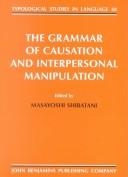
ISBN: 902722952X 1588111199 9027229538 1588111202 9786612161735 1282161733 9027297223 9789027297228 Year: 2002 Volume: 48 Publisher: Amsterdam Benjamins
Abstract | Keywords | Export | Availability | Bookmark
 Loading...
Loading...Choose an application
- Reference Manager
- EndNote
- RefWorks (Direct export to RefWorks)
This volume presents fifteen original papers dealing with various aspects of causative constructions ranging from morphology to semantics with emphasis on language data from Central and South America. Informed by a better understanding of how different constructions are positioned both synchronically (e.g., on a semantic map) and diachronically (e.g., through grammaticalization processes), the volume affords a comprehensive up-to-date perspective on the perennial issues in the grammar of causation such as the distribution of competing causative morphemes, the meaning distinctions among them, and the overall form-meaning correlation. Morphosyntactic interactions of causatives with other phenomena such as incorporation and applicativization receive focused attention as such basic issues as the semantic distinction between direct and indirect causation and the typology of causative constructions.
Causatif (Linguistique) --- Grammar --- Causative (Linguistics) --- Congresses --- Congrès --- LANGUAGE ARTS & DISCIPLINES --- Linguistics / General --- Philology & Linguistics --- Languages & Literatures --- Grammar, Comparative and general --- Causal relations (Linguistics) --- Causative constructions --- Syntax
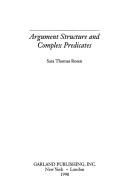
ISBN: 0815301553 0824018869 Year: 1990 Publisher: New York : Garland Pub.,
Abstract | Keywords | Export | Availability | Bookmark
 Loading...
Loading...Choose an application
- Reference Manager
- EndNote
- RefWorks (Direct export to RefWorks)
Causative (Linguistics) --- Grammar, Comparative and general --- Romance languages --- Grammar, Comparative and general --- Causatif (Linguistique) --- Syntagme verbal --- Langues romanes --- Syntaxe --- Verb phrase --- Verb phrase --- Syntax --- Syntagme verbal
Book
ISBN: 9783110251340 9783110251357 3110251353 3110251345 128288526X 9786612885266 3112191919 Year: 2010 Volume: 537 Publisher: Berlin De Gruyter
Abstract | Keywords | Export | Availability | Bookmark
 Loading...
Loading...Choose an application
- Reference Manager
- EndNote
- RefWorks (Direct export to RefWorks)
Dieses Buch widmet sich der diachronen Entwicklung von Valenzalternationen, d.h. der Verwendung eines Verbs in verschiedenen syntaktischen Konstruktionen. Wie entstehen neue Mittel des formalen Ausdrucks der Alternationen, wie breiten sich diese neuen Mittel aus und welche sind die Auswirkungen der Entstehung und Ausbreitung auf bereits bestehende Mittel? Diese Fragen werden im vorliegenden Buch anhand der Entwicklung der französischen Kausativ-Antikausativ-Alternation behandelt.
French language --- Grammar --- Causative. --- Reflexives. --- Verb. --- Grammar, Historical. --- Langue d'oïl --- Romance languages --- Changement linguistique --- Grammaire de dépendance --- Causatif (linguistique) --- Constructions réfléchies (linguistique) --- Linguistics. --- Romance Studies. --- Semantics. --- Syntax. --- Valency. --- Grammaire de dépendance --- Constructions réfléchies (linguistique)
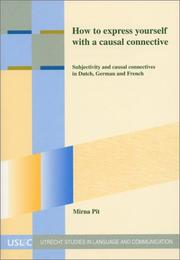
ISBN: 9042008563 9789042008564 9789004458567 9004458565 Year: 2003 Volume: 17 Publisher: Amsterdam Rodopi
Abstract | Keywords | Export | Availability | Bookmark
 Loading...
Loading...Choose an application
- Reference Manager
- EndNote
- RefWorks (Direct export to RefWorks)
The Dutch, German and French languages display a variety of regularly used connectives all of which introduce causes, arguments or reasons, such as Dutch omdat, want and aangezien, German weil, denn and da , and French parce que, car and puisque. Why should languages have different connectives to express the notion of backward causality? The central argument developed in this book is that different connectives express different degrees of subjectivity. In a series of corpus analyses it is shown that the degree of subjectivity of the main participant involved in the causal relation strongly predicts the occurrence of one or another connective. Hence, language users have at their disposal connectives of varying degrees of subjectivity. In an analysis of judiciary sentences, it is revealed that speakers are actually sensitive of this semantic distinction, and sometimes even exploit it for their communicative purposes: in order to conceal their subjective involvement, judges prefer objective over subjective connectives. This volume makes a contribution to the study of language in use, by applying empirical methods to authentic language data. It will be of interest to anyone concerned with discourse coherence, perspective and subjectivity, corpus linguistics and cross-linguistic analyses.
French language --- English language --- Comparative linguistics --- Grammar --- German language --- Causaliteit (Taalwetenschap) --- Causality (Linguistics) --- Causalité (Linguistique) --- Causatiefvormen (Taalwetenschap) --- Causatieve constructies (Taalwetenschap) --- Causatieven (Taalwetenschap) --- Causatif (Linguistique) --- Causative (Linguistics) --- Causative constructions (Linguistics) --- Causatives (Linguistics) --- Oorzakelijkheid (Taalwetenschap) --- Grammar, Comparative and general --- Connectives. --- 801.56 --- Syntaxis. Semantiek --- 801.56 Syntaxis. Semantiek --- Grammar [Comparative and general ] --- Connectives --- Causatif (linguistique) --- Grammaire comparée --- Allemand (langue) --- Français (langue) --- Néerlandais (langue) --- Sémantique --- Syntaxe --- Conjonctions (linguistique) --- Connecteurs --- Connecteurs (linguistique) --- Connecteurs. --- Causitive (Linguistics) --- Connecteurs (Linguistique) --- Connectives (Linguistics) --- Sentence connectors --- Function words --- Syntax --- Linguistics --- Philology --- Grammar, Comparative and general - Connectives.
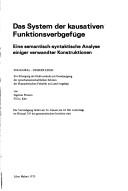
ISBN: 9140041182 9789140041180 Year: 1975 Volume: 42 Publisher: Lund Gleerup
Abstract | Keywords | Export | Availability | Bookmark
 Loading...
Loading...Choose an application
- Reference Manager
- EndNote
- RefWorks (Direct export to RefWorks)
German language --- Causative (Linguistics) --- Allemand (Langue) --- Causatif (Linguistique) --- Verb --- Semantics --- Syntax --- Verbe --- Sémantique --- Syntaxe --- -German language --- -Causative (Linguistics) --- Grammar, Comparative and general --- Causal relations (Linguistics) --- Ashkenazic German language --- Hochdeutsch --- Judaeo-German language (German) --- Judendeutsch language --- Judeo-German language (German) --- Jüdisch-Deutsch language --- Jüdischdeutsch language --- Germanic languages --- Causative constructions --- Sémantique --- German language - Verb --- German language - Semantics --- German language - Syntax
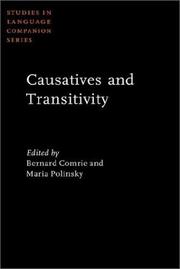
ISBN: 9027230269 1556193750 1283092700 9027285861 9786613092700 9789027230263 9789027285867 9781556193750 Year: 1993 Volume: 23 Publisher: Amsterdam Benjamins
Abstract | Keywords | Export | Availability | Bookmark
 Loading...
Loading...Choose an application
- Reference Manager
- EndNote
- RefWorks (Direct export to RefWorks)
This volume brings together 18 typological studies of causative and related constructions (transitivity, voice, other expressions of cause) by 19 scholars from North America, Western Europe, and Russia. The inspirations for the volume is the pioneering work on causative constructions by the Leningrad Typology Group; several of the contributors have close connections to the charter members of that group, others have appreciated this work from a distance. The volume as a whole is based on the concept of causative constructions as embracing both morphology and syntax, with an important semantic c
Causative (Linguistics) --- Grammar, Comparative and general --- Transitivity --- Causaliteit (Taalwetenschap) --- Causality (Linguistics) --- Causalité (Linguistique) --- Causatiefvormen (Taalwetenschap) --- Causatieve constructies (Taalwetenschap) --- Causatieven (Taalwetenschap) --- Causatif (Linguistique) --- Causative constructions (Linguistics) --- Causatives (Linguistics) --- Oorzakelijkheid (Taalwetenschap) --- Grammar --- Grammar [Comparative and general ] --- Linguistics --- Philology --- Causal relations (Linguistics) --- Transitivity. --- Causative constructions --- Syntax --- Grammar, Comparative and general - Transitivity
Book
ISBN: 9783110224412 Year: 2009 Publisher: Berlin : Walter de Gruyter,
Abstract | Keywords | Export | Availability | Bookmark
 Loading...
Loading...Choose an application
- Reference Manager
- EndNote
- RefWorks (Direct export to RefWorks)
All languages of the world provide their speakers with linguistic means to express causal relations in discourse. The book discusses parameters of categorization that shape the use of causal connectives and auxiliary verbs across languages like English, Dutch and Polish. Convergence of linguistic, corpus-linguistic and psycholinguistic methodologies appears crucial in determining cognitive categories of causality.
Psycholinguistique --- Linguistique cognitive --- Causatif (linguistique) --- Causalité --- Linguistique comparée --- #KVHA:Taalkunde --- #KVHA:Cognitieve linguïstiek --- #KVHA:Causaliteit --- Causation --- Causative (Linguistics) --- Psycholinguistics --- Language, Psychology of --- Language and languages --- Psychology of language --- Speech --- Linguistics --- Psychology --- Thought and thinking --- Grammar, Comparative and general --- Causal relations (Linguistics) --- Causality --- Cause and effect --- Effect and cause --- Final cause --- Beginning --- God --- Metaphysics --- Philosophy --- Necessity (Philosophy) --- Teleology --- Psychological aspects --- Causative constructions --- Syntax --- Linguistique cognitive. --- Psycholinguistique. --- Causalité. --- Linguistique comparée.
Book
ISBN: 9789027231390 9027231397 1299794742 9027271445 9789027271440 9781299794740 Year: 2013 Publisher: Amsterdam Benjamins
Abstract | Keywords | Export | Availability | Bookmark
 Loading...
Loading...Choose an application
- Reference Manager
- EndNote
- RefWorks (Direct export to RefWorks)
This paper is intended as an contrastive study of present narrative in French and in Japanese within the framework of Mental Space Theory. In French the so called "historical present" is a metaphorical use of present tense intending to convey past events as if it were now present before the speaker's eye. But in Japanese the present tense is used to describe the state of past situations without any stylistic effects. The difference comes from the different tense systems of the two languages. In French all events must be indicated from the speaker's position, but Japanese tense indicate only the relation between the event and the v-point spaces. This may account for the use of the present tense in Japanese.
French language --- Japanese language --- Comparative linguistics --- Grammar --- Grammar, Comparative and general --- Syntaxe --- Verbe (Linguistique) --- Français (Langue) --- Japonais (Langue) --- Syntax. --- Verb. --- Grammar, comparative --- Japanese --- French --- Grammaire comparée --- Japonais --- Français --- Japanese. --- French. --- Français (Langue) --- Grammaire comparée --- Français --- Grammaire de construction --- Japonais (langue) --- Anglais (langue) --- Français (langue) --- Italien (langue) --- Phrase verbale --- Causatif (linguistique) --- Sujet et prédicat (linguistique) --- Voix (linguistique) --- Syntaxe. --- Phrase verbale. --- Langue d'oïl --- Romance languages --- Verb --- Language and languages --- Syntax --- Koguryo language --- Grammar, Comparative --- Verb phrase --- Verbals --- Reflexives --- Linguistics --- Philology --- Grammar, Comparative and general Syntax --- Sujet et prédicat (linguistique) --- Français (langue)
Book
ISBN: 0127854266 9780127854267 Year: 1976 Volume: 6 Publisher: New York (N.Y.): Academic press
Abstract | Keywords | Export | Availability | Bookmark
 Loading...
Loading...Choose an application
- Reference Manager
- EndNote
- RefWorks (Direct export to RefWorks)
Grammar --- Causative (Linguistics) --- Generative grammar --- Semantics --- Congresses --- Causatif (linguistique) --- Sémantique --- Grammaire générative --- Congresses. --- 801.56 --- -Generative grammar --- -Semantics --- -Formal semantics --- Semasiology --- Semiology (Semantics) --- Comparative linguistics --- Information theory --- Language and languages --- Lexicology --- Meaning (Psychology) --- Grammar, Comparative and general --- Grammar, Generative --- Grammar, Transformational --- Grammar, Transformational generative --- Transformational generative grammar --- Transformational grammar --- Psycholinguistics --- Causal relations (Linguistics) --- Syntaxis. Semantiek --- Derivation --- Causative constructions --- Syntax --- -Syntaxis. Semantiek --- 801.56 Syntaxis. Semantiek --- -801.56 Syntaxis. Semantiek --- Formal semantics --- Sémantique. --- Grammaire générative. --- Causative (Linguistics) - Congresses --- Generative grammar - Congresses --- Semantics - Congresses --- Sémantique. --- Grammaire générative.
| Listing 1 - 10 of 12 | << page >> |
Sort by
|

 Search
Search Feedback
Feedback About UniCat
About UniCat  Help
Help News
News